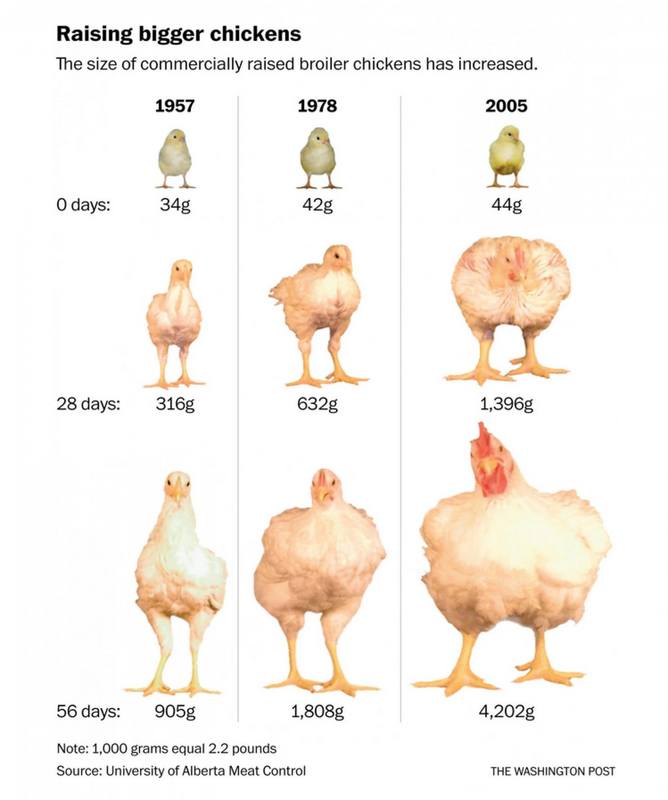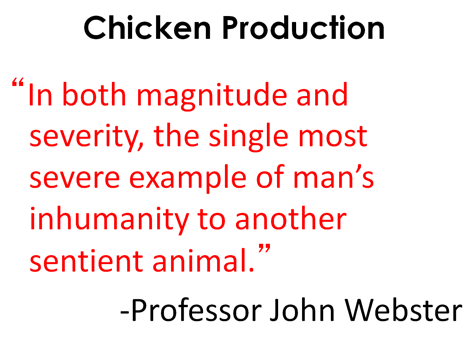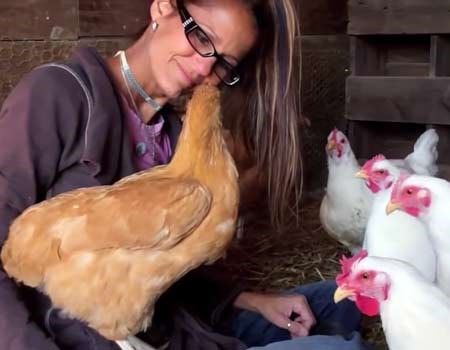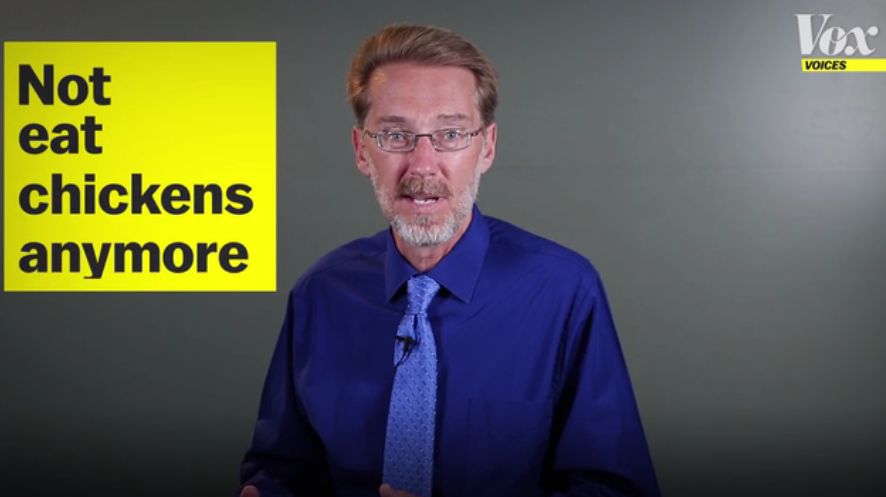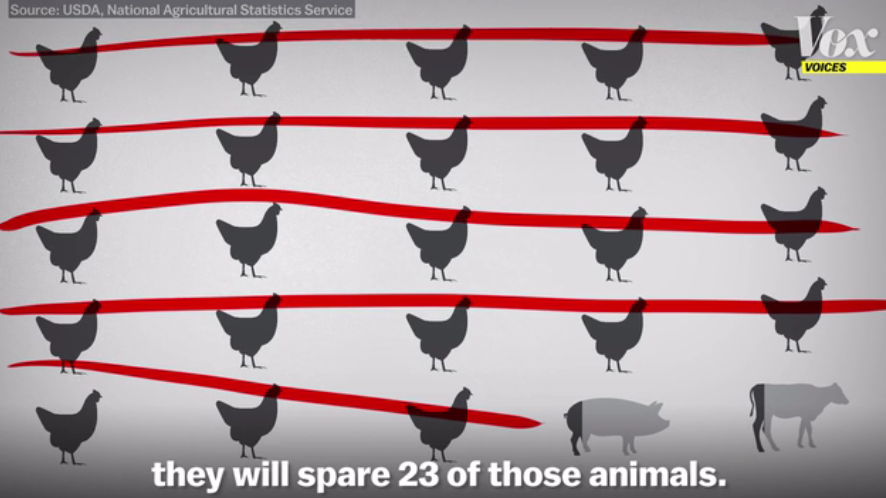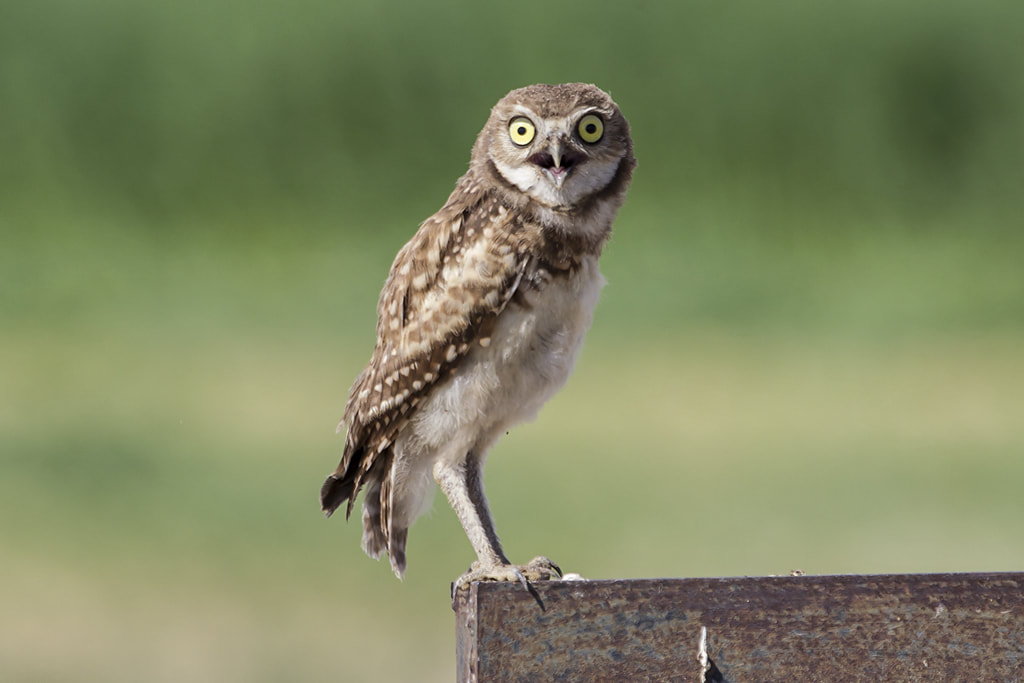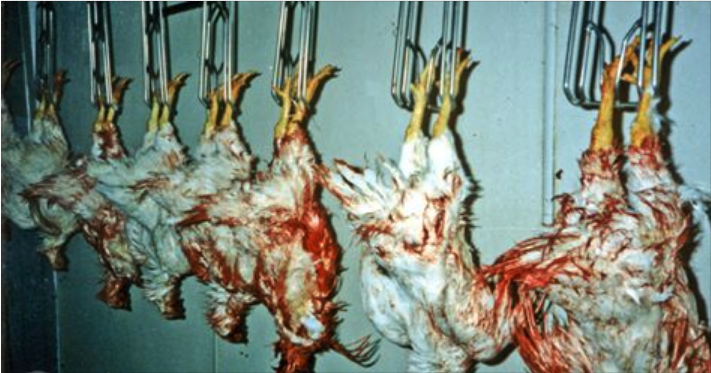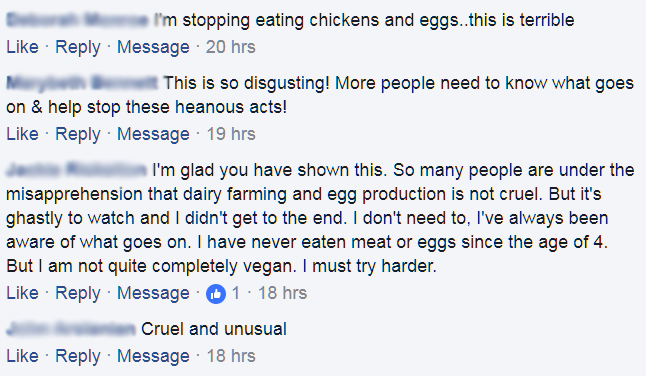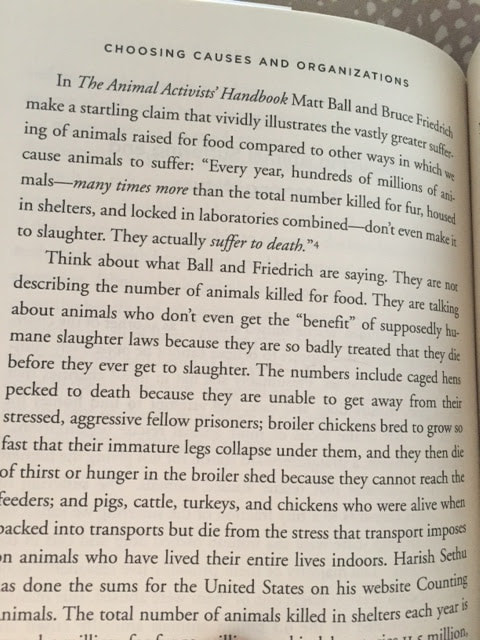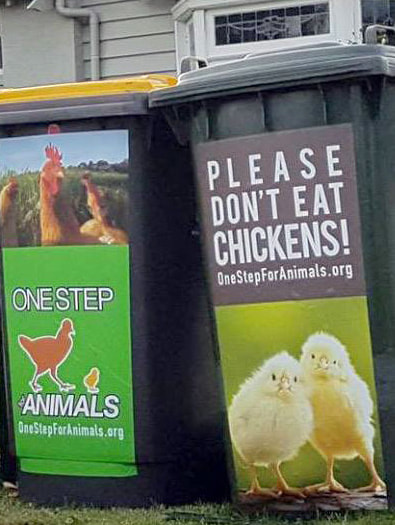|
A One Step member passes along this from Steven Pinker's book The Better Angels of Our Nature: If someone were to count up every animal that has lived on earth in the past fifty years and tally the harmful acts done to them, he or she might argue that no progress has been made in the treatment of animals. The reason is that the Animal Rights Revolution has been partly canceled out by another development, the Broiler Chicken Revolution. The 1928 campaign slogan "A chicken in every pot" reminds us that chicken was once thought of as a luxury. The market responded by breeding meatier chickens and raising them more efficiently, if less humanely: factory-farmed chickens have spindly legs, live in cramped cages, breathe foul air, and are handled roughly when transported and slaughtered. In the 1970s consumers became convinced that white meat was healthier than red (a trend exploited by the National Pork Board when it came up with the slogan "The Other White Meat"). The result was a massive increase in the demand for chicken, surpassing, by the early 1990s, the demand beef. The unintended consequence was that billions more unhappy lives had to be brought into being and snuffed out to meet the demand, because it takes two hundred chickens to provide the same amount of meat as a single cow. Now, factory farming and cruel treatment of poultry and livestock go back centuries, so the baneful trend was not a backsliding of moral sensibilities or an increase in callousness. It was a steadily creeping up of the numbers, driven by changes in economics and taste, which had gone undetected because a majority of people had always been incurious about the lives of chickens. Please be a part of our efforts to stand up for chickens and reverse this trend!
0 Comments
If you’ve read A Meaningful Life, you know that a chronic disease led me to make reducing suffering my life’s work. My brush with death in 2014, and again this year, helped me stay focused on what is really important. This seven-minute introduction to a Sam Harris podcast is another prompt to ask ourselves the most important questions. In this case: What will be your legacy? If you’re reading this, you are also dedicated to reducing the suffering of others as much as possible, regardless of the visibility or familiarity of the individual who is suffering. Thanks so very much for being a loyal part of our vital work together. We never take your dedication and support for granted. We will continue to do our very best, every day, to make your legacy as powerful and lasting as possible. Have you seen this Vox Voices video with One Step co-founder Matt Ball: This video has more than 1.1 million views on Vox’s YouTube Channel and over 500,000 on Vox’s Facebook page! Also, please note what Matt actually says vs. what Vox chose for the title and B-roll. You will also like this audio interview ARZone did with Matt as a follow-up to the discussion surrounding the Vox video and CBC interview. Since these interviews, One Step has received a lot of insightful feedback, such as: “Just wanted to say I enjoyed the ARZone interview. Specifically, the way you handled the fish question, pointing out the relative lack of consumption of fish by the young, and the increased receptivity, in general, by the young. It shows how much thought you and others at One Step have put into these issues.” If you agree that record levels of animal suffering require us to rethink, please share this email with other thoughtful people. Also, please keep One Step’s work in your end-of-year donation planning, so we can reach even more people in 2018 with our actionable and sustainable message. As always, your tax-deductible donation will be truly doubled dollar-for-dollar, helping twice as many animals! All long-time supporters know that One Step is continually striving to make sure our outreach is as cost-efficient as possible. Experiment, Evaluate, Repeat. All to give you the biggest bang for your buck, to allow you to save a chicken’s life for mere pennies. We wanted to update you on two fronts. Based on a wide variety of feedback, our amazing design Mandy created two booklets. George, our tech wizard, A/B tested these booklets over the course of several weeks. One of the booklets stood out, with only 2% of readers saying they would eat more chicken (vs 15%), and 24% said they’d eat “a lot more” plant-based meals (vs 10%). Also, we found that even with Facebook’s increasing costs, our continual testing and optimization is paying off. For example, our campaigns this November were 33% more cost-effective than last November! The bottom line is that your secure donation – which will be truly doubled and accomplish twice as much – will go to efforts continually tested and optimized to reduce suffering as much as possible. During this giving season, please continue to support One Step’s work! What would it look like if all that mattered was reducing suffering?
That is the entirety of our motivation at One Step. We looked for where there was the most suffering. Then we honestly analyzed the results of decades of advocacy. We found these five harsh but undeniable facts, which drove our two guiding principles:
You are sure to receive many requests for support over the next days and weeks. There are many incredible groups doing amazing work out there. Please consider supporting One Step’s work today. Your donation – which will be truly doubled and accomplish twice as much – will go to efforts continually tested and optimized to reduce suffering as much as possible. 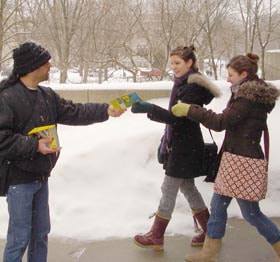 Co-founder and history’s all-time leading volunteer leafleter Joe Espinosa reflects on a quarter century of advocacy: “25 years ago on this very evening, I attended my third meeting of Students for Animal Rights at the University of Illinois, Urbana-Champaign. I let the group know I had not eaten meat in 6 days, and did not think I ever could again. I realize that I am ... shall we say ... a rather unusual person, going from an ag kid (my uncle taught me dairy farming from age 6-13, and I entered UIUC in the College of Ag) to dropping meat 21 days after seeing the suffering chickens and turkeys endure in modern farming. “Further evidence of the peculiarity is my volunteer work in animal protection, as no other volunteer has handed out 600,000+ animal protection booklets. With that in mind, and a mountain of negative data to back up the rarity of someone going from meat eater to vegetarian or vegan very rapidly, and high recidivism if they do, we established One Step for Animals in 2014. “Drawing on the lessons of history, One Step presents a more doable ask: sparing 25 of the 26 land animals the average person eats each year. After spending hundreds of millions of dollars over the past 20 years, animal protection has failed to increase the percentage of people who are vegetarian or vegan. More importantly, we have failed to decrease the number of animals raised and killed for food. Per-person animal consumption is at an all-time high. “I hope more people can use my 25 year vegeversary as a time to question the idea of doing the same thing and expecting different results. We believe we should try something new. One Step For Animals welcomes those who care about sparing animals above all else. “Thanks for being one of us!” Here are a few comment from one of our many online ads. Thanks so much for funding this work with your donations! We know you have many choices for you contributions, and we will always work to make sure your contribution goes as far as possible to reduce suffering.
We recently came across this picture of a page from Peter Singer’s book, The Most Good You Can Do, talking about one of the arguments Matt Ball and Bruce Friedrich make in their book, The Animal Activist’s Handbook (first spelled out in Matt’s A Meaningful Life): “In The Animal Activists’ Handbook Matt Ball and Bruce Friedrich make a startling claim that vividly illustrates the vastly greater suffering of animals raised for food compared to the other ways in which we cause animals to suffer: ‘Every year, hundreds of millions of animals – many times more than the total number killed for fur, housed in shelters, and locked in laboratories combined – don’t even make it to slaughter. They actually suffer to death.’
“Think about what Ball and Friedrich are saying....” This stark reality is just one of the simple but profound facts that drive One Step’s advocacy. If you agree with Professor Singer and want to reduce suffering as much as possible, please consider a contribution to One Step. Every donation you make will go to maximum harm reduction and be doubled, dollar for dollar! 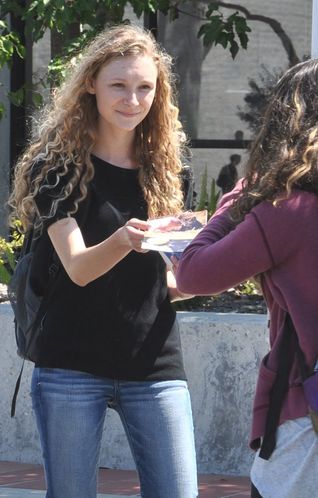 As you know, one of the most powerful aspects of One Step’s online outreach is that we're constantly testing and evaluating new ads – everything from the tagline, image, and audience, to the size, shape, color, and font of the landing page button. Obviously, this is not something we can do with our booklets. We receive a lot of feedback from people who’ve received a One Step booklet, and our leafleters have discussions while in the field. Combine that with the experience of our team, and we continue to refine our booklets with every printing. However, recent feedback has given us ideas that can't be implemented in one printing. Thus, our tech wizard George is setting up an A/B test of two different designs by the masterful Mandy. This way, our next printing will be the best possible version. You can help! The more people we can survey, the more likely we are to get statistically-useful information – with the added bonus that more people will read one of the booklets. Would you consider a special donation today to increase our A/B audience size? We plan to start the test in a few days, so your donation today will directly determine how many new people we reach! And of course, your donation will always be doubled, dollar-for-dollar! Thanks so very much!! PS: Thanks to Greg, yet another wonderful volunteer, One Step has a new donation page. In addition to being able to contribute with a credit card or PayPal, you can now do direct bank transfers as well! If you can find an error on the new page, we'll send you a free bumper sticker. Please contact us with your feedback. Thanks again!! |
|

